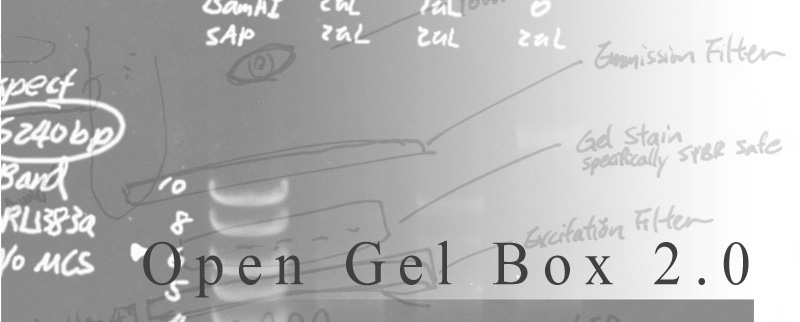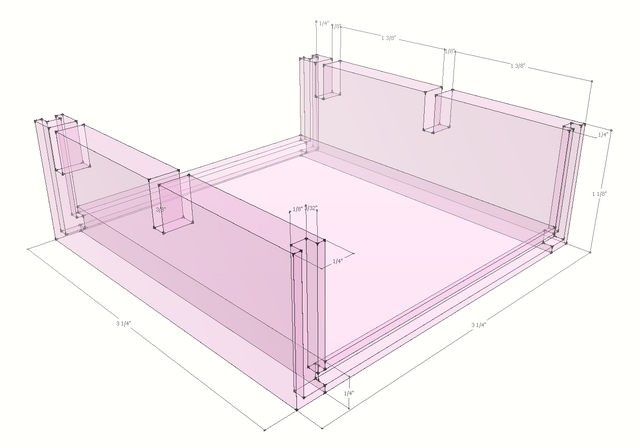DIYbio:Notebook/Open Gel Box 2.0/RFC1

<html><a rel="license" href="http://creativecommons.org/licenses/by-sa/3.0/us/"><img alt="Creative Commons License" style="border-width:0" src="http://i.creativecommons.org/l/by-sa/3.0/us/88x31.png" /></a>
This work is licensed under a <a rel="license" href="http://creativecommons.org/licenses/by-sa/3.0/us/">Creative Commons Attribution-Share Alike 3.0 License</a></html>
Title
Open Gel Box 2.0
Author List
Norman Wang <wangn(at)hawaii.edu>*, Tito Jankowski <titojankowski@gmail.com>*, Philip McIntosh <ndpmcintosh@earthlink.net>, Jim Hardy <hardy (at)gahaga.com>, Mackenzie Cowell <mac(at)diybio.org>
Purpose
Gel electrophoresis is one of the most basic and commonly used tool for molecular biology. However, the gel electrophoresis apparatus available on the market often lack essential features that would make more pleasant for performing this daily routine. We aim to create a professional grade open and extensible electrophoresis gel box, available as design documents, unassembled, and assembled kits for researchers to obtain and improve upon.
Audience:
- Hobbyists: want a gel box to do simple experiments. Order a flatpack, similar to IKEA, containing all the necessary pieces, wires, assembly instructions, and a usage protocol. Assemble the box and start running experiments.
- DIY Biologists: make the Super gel box even better. The design is free to download and will be improved by everyone. From the biologist who needs a custom illuminator to the engineer who wants to design it. Design, test, re-design!
- Teachers and Students: who need low cost gel electrophoresis equipment. Imagine how a classroom laboratory would change if the equipment were $50 and the experiment took 10 minutes instead of an hour! The community will provide pre-assembled devices where appropriate. Mass production makes more sense when this group gets more involved.
- Professional Biologists: who want a better gel box, but may not have the time necessary to assemble it.
Summary
- Creative Commons Attribution-Share Alike 3.0 License
- Simple, minimalist design
- Inexpensive, using off the shelf parts
- Better features and improvements over electrophoresis gel boxes currently available on market
- Built In gel casting tray
- Built In/Swappable excitation light source and corresponding excitation/emission filter
- Enable in-box gel manipulation by adjustable buffer immersion height
Specification
- Open Source Design
- Modification of designs are required to be distributed under creative commons license: shared-alike and given proper attribution
- To be recognized as "Open Gel Box 2.0", design modifications must be submitted as an RFC following the rules outlined in BBF:RFC0
- Simple enough design so anyone with reasonable knowledge of electrophoresis separation can build and improve upon it by having the following
- Materials
- Tools/skills
- Acrylic cutting
- Acrylic gluing
- Pliers
- Soldering Iron
- Electrophoresis
- Must support separation of molecules: DNA
- Must allow using agarose as the separation medium: concentration from 0.8% to 4.0%
- Must support/withstand electrophoresis buffers: TAE, TBE, SB, LB, LA
- Must allow safe usage of electrophoresis voltages between 0-350V
- Must withstand use of stain: EtBr, SYBR Safe
- Safety
- Must have fool-proof voltage disconnect upon lid removal
- Must not allow dangerous levels of offgas & evaporation build-up
- Environmental Considerations
- Should reduce plastic waste generated during gel box manufacturing
- Should reduce reagent & eliminate unnecessary consumable use and therefore savings on operational cost
- Should reduce chemical waste generated from each gel electrophoresis run
- Casting
- Power Supply Connection
- Must have attached cables, one red(+), one black(-), with standard 4mm male banana connectors
- Should have cable length of 50-80 cm (19.68in-31.49in)
- Must support in-box visualization of stained molecules
- Excitation Source
- Must have compartment allowing swappable excitation LED module
- Must have feature allowing swappable excitation filter/light source
- Emission Filtering
- Must have feature allowing swappable emission filter/light source
- Excitation Source
- Must allow in-box on-gel DNA manipulation
- Band stabbing
- Band cutting
- Dialysis tube/silica membrane band extraction
- Optional Modular Extension
- Should have Camera Mount
- Should have Buffer Cooling Ports or Cooling Attachment
- Optional multi-gel casting tray (separate unit)
Methods
- Excitation Source & Filter Selection
- Emission Selection
